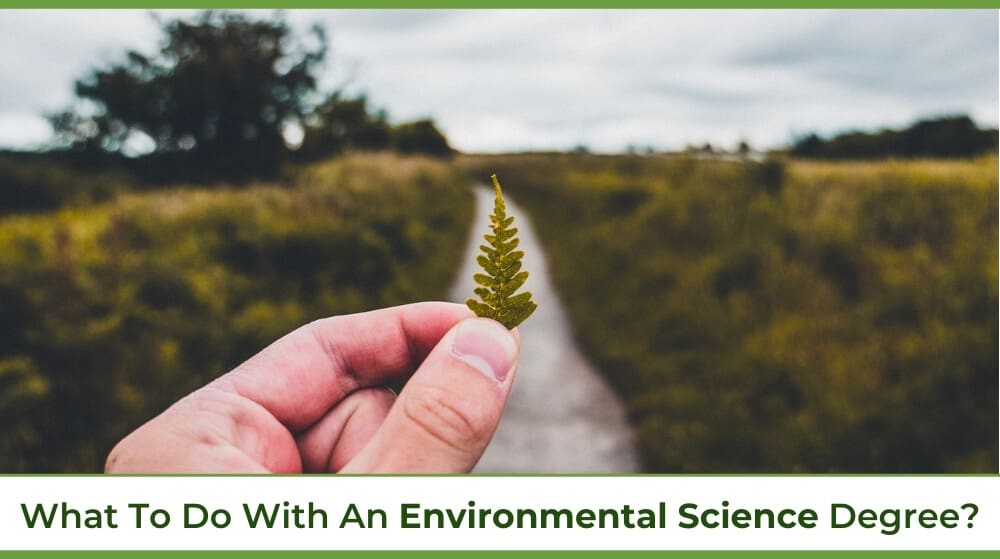
What Is Environmental Science? 5 Reasons Why To Study It
Do you want to solve environmental problems or help build a more sustainable future? If so, a career in one of many environmental sustainability studies might be the perfect path for you, but first, what is environmental science?
Even if you are not entirely set on a major yet, keep reading to learn more about how environmental sciences are being developed and applied to practices across industries to conserve resources, reduce carbon emissions, and foster a healthier planet. We start with the definition of environmental science and then explain why it’s such a valuable field of study.
- What Is Environmental Science?
- Why Is Environmental Science Important?
- Why Study Environmental Science?

What is environmental science about? Explore our bachelor’s degree in environmental science to find out.
What Is Environmental Science?
Environmental science is an interdisciplinary field of study encompassing aspects of physics, chemistry, biology, geography, and other disciplines. It aims to understand the environment and how humans impact it. It’s not just a study of the environment but also of possible solutions to environmental issues such as deforestation, global warming, and pollution.
What Do You Learn In Environmental Science?
Let’s dive deeper into the question of what is the study of environmental science. A degree in environmental science covers topics such as ecology, conservation, and environmental law and policy. When you study environmental science, you will develop skills including but not limited to:
- Evaluating alternative energy sources
- Ecosystem analysis
- Environmental impact assessment
- GIS technology
- Implementing sustainable development principles
Why Is Environmental Science Important?
Environmental scientists do a lot of “behind the scenes” work in laboratories and on field sites. It’s not always a glamorous job, but this important work often informs policy decisions, business practices, and public awareness. The importance of environmental science has never been greater as the entire natural world is experiencing the negative effects of climate change. It is key to finding new solutions and ways to adapt to a changing planet.
Understanding The Interconnectedness Of Ecosystems
Environmental science is the study of relationships within and between ecosystems. It helps us understand the complex interactions that occur in ecosystems and the impacts humans have on them. It’s easy for people in the modern world to forget how interconnected we are with nature, but everything we do has cascading effects on the environment around us. Scientists help us understand these effects and how to minimize them.
Addressing Climate Change And Global Warming
We’re already seeing alarming trends from climate change that are predicted to worsen over the coming years, including rising sea levels, more extreme storms, droughts in some areas, and increased wildfires. Some of these impacts may be reversible, while others can only be mitigated at this point. To do anything impactful, we need professionals who fully understand the extent of the problem and have the skills to create new, innovative solutions. A B.S. in Environmental Science and Climate Change can provide the skills and knowledge necessary to combat global warming.
Promoting Sustainable Resource Management
Environmental science guides sustainable resource management by helping us understand and preserve biodiversity as well as maintain soil and water quality. Scientists encourage companies, governmental agencies, and individuals to consume natural resources in responsible and sustainable ways. Depending on their specialization, environmental scientists may work as consultants for businesses or in parks, fisheries, or forests.
Driving Policy And Environmental Legislation
Environmental science also influences and shapes environmental policies and legislation. Not only has scientific research led to the creation of laws and regulations aimed at protecting the environment, but environmental scientists are often responsible for conducting field site surveys and other tests to ensure compliance with those laws and regulations. If you are particularly interested in legislation and public policy, you may find a B.S. in Environmental Studies more suitable than environmental science for your career goals.

Ready To Learn More About Unity Environmental University?

Learn more about the differences between environmental studies vs environmental science.
Why Study Environmental Science?
Students who graduate with an environmental science degree have numerous career opportunities. You can work in research, consulting, education, or legislation. No matter which path you choose, studying environmental science can empower you to positively impact the planet.
Why should I learn about environmental science? Below are the top five reasons:
- A career with a purpose: When you work in an environmental science job, you get to have a positive impact on the planet every day. You can directly impact environmental policies, conservation efforts, and people’s individual choices.
- Job security: Many environmental science jobs are in high demand and will continue to be over the next decade as you enter the workforce. Qualified professionals will be needed to address the continued effects of climate change. In fact, current employment reports show a widening gap between supply and demand for workers with at least one green skill.
- Good earning potential: While the average salaries for environmental scientists vary greatly by position, there are many green jobs that pay well.
- Social and emotional well-being: Earning a college degree increases your earning potential and gives you access to new opportunities, but did you know it can also make you a happier and healthier person? People with degrees have a longer lifespan on average and report being happier overall than people without degrees.
- Connection with nature: Many environmental scientists spend a lot of time outside in nature, and research shows that being in nature has physical, emotional, and cognitive health benefits for humans, all of which can help increase your overall quality of life.

Start A Career In Environmental Science At Unity Environmental University
Pursuing a career in environmental science is a smart choice for you as an individual and for the planet as a whole. Because of the multidisciplinary nature of the field, there are many different career paths to choose from. Environmentally-focused degrees cover many areas including agroforestry, sustainable business practices, resource conservation practices, regenerative hospitality and much more.
If you want 100% online degrees, check out Unity’s B.S. in environmental science and climate change.





